
LIVING
Shelter keeps families together as they work to rebuild their lives
1/29/2017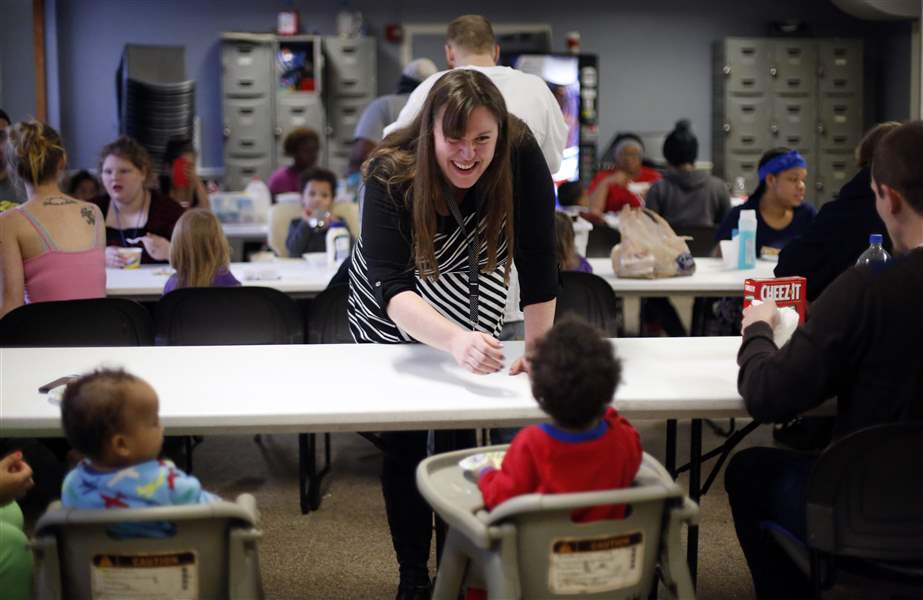
Renee Palacios, Family House director, smiles at Preston Hicks, 2, during lunch at Family House.
The Blade/Amy E. Voigt
Buy This Image
Look into the eyes of 28-year-old Brian Roberts, and you’ll see a streetwise Toledoan who’s been through hell, someone who wants to do right by his family despite what life throws at him.
A stepfather who raised him committed suicide on Christmas Day in 2008. This past Christmas, Mr. Roberts — who has struggled to make ends meet for his longtime girlfriend and four kids they’ve had together — wound up back in a homeless shelter with his family for the second time in four years.
“Christmas brings back bad memories for me,” Mr. Roberts said while reminiscing about how he and his family thought they had gained at least a little stability in their lives when he reconnected with his biological father a while back.
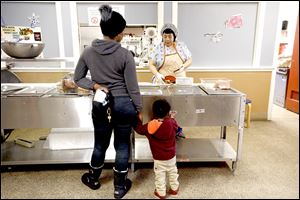
Employee Shirley Campbell, right, serves lunch to a mother and son who are staying in the Family House in Toledo.
He said they lived for almost a year with his biological father in a rough North Toledo neighborhood along Lagrange Street, a place where Mr. Roberts’ younger brother also lived. But everyone was ultimately evicted because rent went unpaid for four months, Mr. Roberts said.
Life is messy that way. There are a lot of loose ends — hard-luck stories without neat, happy endings.
While his father and brother had someone willing to take them in, Mr. Roberts had few options.
On Dec. 28, he and his girlfriend of 10 years, Brittiany Stiles, also 28, went back to Family House, one of Ohio’s few shelters that promote family togetherness. When they were there four years ago, two of their children, Jazmine, 6, and Sophie, 5, were barely old enough to know what was going on. Now, it’s the four of them, plus the couple’s two youngest children, Carson, 3, and Kemper, a 7-month-old infant, who weren’t born the last time they were there.
“That’s the reason we came back here,” said Mr. Roberts, who also had a daughter with an ex-wife. “Our first experience was good. The staff here is people-friendly.”
Now serving 300 families a year, Family House is the second-largest facility of its kind in Ohio. Its executive director, Renee Palacios, said about 10 percent of the people it takes in are from outside northwest Ohio, some as far away as the South, a sign that family-oriented shelters are still in short supply nationally.
Family House was created 28 yeas ago out of a vacant 1922 building originally used as a YMCA. Several members of the local faith community were behind it. Today, those involved with it include the Rev. John Roberts of Indiana Avenue Missionary Baptist Church, the Rev. Robert A. Culp of First Church of God, and the Rev. Willie L. Perryman of Jerusalem Missionary Baptist Church. Its board members include former Toledo Mayor Carty Finkbeiner and members of the local business community.
“Dignity is our core value,” Ms. Palacios said several times throughout an extensive interview and tour.
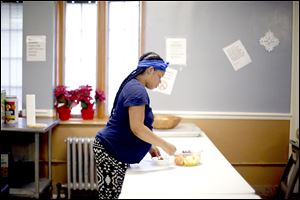
Jasmeire Williams plates some fruit during lunch at Family House.
The facility began as more of a traditional shelter for women and children. After three years, the need for an all-encompassing shelter promoting family togetherness became clear. Facility officials grew weary of seeing so many people exchange hugs and shed tears as fathers left their significant others and children behind. Many went to Cherry Street Mission Ministries at 105 17th St., about a mile away, where they stayed barracks-style with other men.
As many as 36 families can stay for up to 90 days at a time, each getting their own dormitory-style rooms. The larger rooms can accommodate up to eight people, Ms. Palacios said.
“I don’t see our folks as downtrodden,” Ms. Palacios said, adding that the shelter has mandatory classes in anything from nutrition to finance. “We don’t have regulars, because, if we do, we’ve failed.”
State of mind
Mr. Roberts said his anxiety is eased because he is able to stay with his family. He said the arrangement helps make life a little less trying for his girlfriend and their children, too.
“It keeps me relaxed because I’m here with them,” Mr. Roberts said. “It keeps everybody calm.”
He said he is encouraged by a job lead and soon hopes to get called for a second interview.
Homelessness is a complex and nuanced problem, often caused by a series of events that evolve over many years and go beyond bad luck and poor lifestyle choices.
“Nobody wakes up one day and says they want to live in a homeless shelter,” Ms. Palacios said. “Sometimes, this is that bottom for folks who have hit rock bottom.”
As executive director, she tries to strike a balance between comforting words and pragmatism.
“People are pretty broken when they get here,” Ms. Palacios said. “We meet you where you’re at with kindness and humility.”
The stress can be enormous on couples. The instincts parents have to be their kids’ providers often is accentuated and is a leading cause for break-ups. Men especially can feel humiliated when they can’t find adequate housing for their families, often exhausting all other possibilities such as living out of cars or with friends or relatives first, she said.
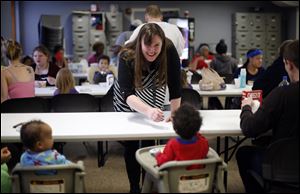
Renee Palacios, Family House director, smiles at Preston Hicks, 2, during lunch at Family House.
Toledo Public Schools has a known population of 2,100 homeless kids, Ms. Palacios said, although she believes the figure is likely much higher because of the stigma attached to homelessness and the extent to which many parents try to conceal their situation.
Several families served are those headed by single mothers, many who have aspirations of getting their degrees, better jobs, and more stability in the lives of their children.
Amanda Workman, 34, works at the local Marcos pizza chain and lauds it for being flexible with the needs of her son, Preston, 2. But even though she’s working, she said she struggles to get enough hours to make ends meet and have a place of their own.
“Everyone was telling me about this place,” Ms. Workman said of Family House, where she and Preston moved Jan. 13. She said her ex-husband was previously there with their 7-year-old son, Aidan, who took it upon himself to pick up her cell phone and call 911 when Ms. Workman collapsed Dec. 22.
Ms. Workman said she woke up in a local hospital on Dec. 23, groggy and not sure what had happened. She said she was diagnosed with epilepsy.
Now, her health has become another source of stress.
“If I have a seizure at work, I can’t work,” she said.
Ms. Workman said she wants to get her high school equivalency diploma. She eventually hopes to get a job helping elderly residents at nursing homes. She said she has a passion for that kind of work and wants to do it because “one person can change the outcome for many.”
“My whole goal is to get out of here as soon as possible,” Ms. Workman said. “Basically, we’re just trying to get one step ahead.”
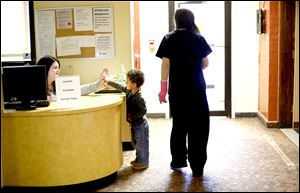
Employee Taylor Tye, left, gives little resident Preston Gould, 2, a high five, while his mother, Amanda Workman, watches after lunch in Family House.
No place like home
Despite efforts made to lessen burdens, life’s hard at Family House and other shelters.
One 23-year-old woman said she’s six months pregnant and trying to figure out the next step for her future baby and her 3-year-old son. She said she came to Family House because of an abusive relationship.
“He’s stressed out like I am,” she said of her son.
Another single mother, Anisa Thomas, 21, is near the end of her 90-day stay. She’s at Family House with her sons, Preston, 2, and Princton, 1.
“I think they take care of everybody here,” Ms. Thomas said.
For the past six years, Family House has been led by the effervescent, plainspoken Ms. Palacios, a native of rural Berkey, Ohio, who said her parents thought she was “out of her mind” for settling into a seemingly thankless job in Toledo’s central city.
She said Family House strives to take a holistic approach.
On the first floor is a preschool, complete with a bathroom decorated especially for children. There’s also an “after-care” room, where parents can take a few gently used household items, such as donated pots and pans, when they leave.
Down the hallway is a room where guests can get donated clothing. School supplies and TPS uniforms are provided.
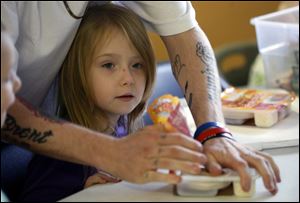
Brian Roberts helps his daughter Jazmine Roberts, 7, of Toledo, open packages for her during lunch at Family House.
On the building’s second floor is its private library, with books for children arranged by age levels. Across from that is a computer laboratory, where people are encouraged to look for jobs and taught how to save documents such as resumes on flash drives. On the same floor is an office where volunteer nurses and students work. There’s also a laundry room and a large living area with a small television set and lots of toys.
“We’re investing in the folks while they’re here,” Ms. Palacios said.
Each adult resident is assigned chores. The facility’s goal is to teach people “that homelessness is a temporary situation,” she said.
About three-quarters of its clients are rehoused within 42 days, Ms. Palacios said.
Family House has a 14-member staff and a $650,000 annual budget. Only four of those 14 employees are full-time. Nearly all labor for major improvement projects — such as the library upstairs and classroom remodeling on the first floor — is donated by local trade workers and service organizations, Ms. Palacios said.
The facility has served 800 people since its founding, of which 500 were children when they received services.
Family House succeeds in part because of the loyalty of people associated with it.
“I’ve been here six years, and I’m one of the rookies,” Ms. Palacios says, then jokingly finishes the sentence by saying, “and it’s not because I pay [other employees] well.”
The sense of dignity Family House promotes begins with little things, such as which donated canned goods they put on their shelves for clients to take when they leave and how they’re distributed within the building.
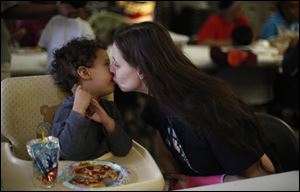
Amanda Workman pauses during lunch to give her son Preston Gould, 2, a kiss.
“You know that stuff on the front row of your shelf at home?” Ms. Palacios said, referring to more popular and accessible foods such as peanut butter and canned spaghetti-and-meatballs. “That’s what they want. They’re people, too.”
When the time comes for families to leave Family House, they’re allowed to take a shopping cart and remove food items they want directly from pantry shelves as opposed to having someone hand them a pre-packaged box of items. It’s a small distinction, but one that makes a difference so people aren’t stuck with things they won’t use, Ms. Palacios said.
For those looking to help a homeless shelter, coats, gloves, and mittens are fine. But what they really need is underwear, she said. Yes, underwear, as well as laundry detergent, soap, and toilet paper.
“We need toilet paper because we have a lot of butts,” Ms. Palacios said.
The best compliment Family House employees get are signs that they have made some sort of positive changes in the lives of their guests, even if it’s incremental.
“I crave it,” Ms. Palacios said. “It’s in my soul.”
Contact Tom Henry at: thenry@theblade.com, 419-724-6079, or via Twitter @ecowriterohio.